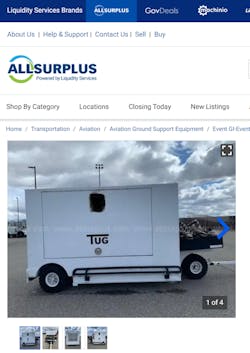Secondhand Equipment’s Role in GSE Sustainability
With major climate goals in sight, the aviation industry is keen on promoting sustainable operations.
Chief among these initiatives is a transition to electric ground support equipment (eGSE) as introducing more eGSE can reduce the carbon emissions produced by airlines and ground handlers.
Avoiding unnecessary waste can also add to sustainable ground operations, explains Elizabeth Maxted, vice president and general manager, Capital Assets Group – Americas at Liquidity Services. As the industry invests in new technology, legacy GSE often has more useable life.
In these cases, Liquidity Services helps find a new home for the equipment before units are scrapped for parts.
“The simplest way to describe what Liquidity Services is, is we’re an online marketplace for business surplus. And what’s interesting is we range from selling excess government vehicles to returned inventory to main retailers like Target, to Delta Air Lines’ ground support equipment,” she says.
“We provide a very structured and compliant process to help owners of excess surplus value that surplus, so they know how much it’s worth – even though it’s been used over a period of time,” Maxted continues. “We try to help facilitate redeploying it first within their own footprint, so they can make use of their own surplus in other locations or regions.”
If a company cannot redeploy GSE in its own operation, Liquidity Services helps facilitate a sale.
“We are fueling the circular economy. We are trying to extend the life of an asset as-is, for its original intended purpose, before you get to recycling it for components or parts,” Maxted says. “We’re promoting reuse before any of that recycling and latter part of the green value chain comes into play.”
Benefits of Secondhand GSE
According to Maxted, Liquidity Services’ ability to rehome used GSE provides a number of benefits.
First, the business model allows the seller to generate revenue.
“We have an online auction marketplace called allsurplus.com, where you can buy business surplus. That’s where we put the used GSE,” she explains. “We’ll work with a client, like a Swissport or Signature Flight and Delta. We help accurately describe its current working condition, share representative photographs and then we actually get it on our online marketplace and sell it for them.
“We are the compliant, online transaction part in that equation – finding a buyer and facilitating that for the buyer.”
Buyers can also generate revenue from this process. Maxted notes some buyers purchase the used GSE to refurbish it and resell it.
For buyers that intend to use the GSE themselves, secondhand equipment can be more affordable and can be deployed into their operation quickly.
“There’s good life in these ground support pieces, and our goal is to help recover working capital and find a new home for this surplus so it can extend its life,” Maxted says.
Not creating waste is a key sustainability element.
“The idea of the circular economy is to continue to keep something in its working condition as it’s purposely intended for, as opposed to cannibalizing for parts. Then it’s non-working and you would break it down and sell it for more scrap pieces. That’s what we’re trying to avoid by finding buyers who are willing to refurb and put it back in circulation,” Maxted says. “Or if the piece we have is in good working condition, find a home for it with a new operator.”
Liquidity Services works with many small- and medium-sized operators in need of equipment around the globe. Many times these customers have a piece of equipment go out of service and needs a replacement fast. Compared to lead times for new equipment, Liquidity Services can often be a good source for a shortened cycle time.
Change Takes Time
“Whether it’s the airline or the airport, we’re seeing that regulations are putting pressures to reduce carbon emissions,” Maxted says. “For us, the way we see that is it’s requiring an investment of the airport or the airline. And that investment is in the green, renewable space – electric fleets.
“We see ourselves being able to help the airports and airlines help achieve that investment by selling their surplus because we can help generate working capital for them to expedite their investment,” she continues. “An investment in a new technology doesn’t mean that a working pushback, belt-loader, container loader, luggage tugs aren’t good, functional pieces of equipment. Our goal is to then find a new home for them.
Investments in eGSE, charging infrastructure and other sustainable initiatives won’t happen overnight, Maxted notes.
“It takes a long time for airlines and airports to make that investment,” she says. “So, we’re trying to help facilitate that change by generating working capital that helps expedite that investment, and secondly, taking good equipment and keeping it in use instead of recycling or scrapping.”
About the Author
Josh Smith
Editor
Josh Smith served as editor of Ground Support Worldwide as editor from 2016 through 2024. He oversaw production of the print magazine, created GSW's newsletters on a daily basis, and updated the latest news on AviationPros.com.

